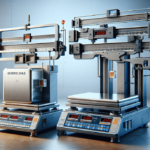Choosing the Right Weighing Scale: Mettler Toledo BC-60 vs. Brecknell PS150
In industries where precision in weighing is paramount, selecting the appropriate scale is crucial for operational efficiency and accuracy. Two prevalent options in the market are the Mettler Toledo BC-60 and the Brecknell PS150. Both scales offer high-quality measurements, but they cater to different needs and budgets. This comprehensive comparison delves into their features, pricing, accuracy, durability, ease of use, customer feedback, and the pros and cons of each to help you determine which scale aligns best with your business requirements.
Overview of Mettler Toledo BC-60 and Brecknell PS150
The Mettler Toledo BC-60 is a versatile bench scale suitable for applications in manufacturing, food service, and shipping. It boasts a maximum capacity of 150 pounds with a readability of 0.05 pounds. The scale is constructed with a stainless steel platform and a painted steel frame, ensuring durability and ease of maintenance.
On the other hand, the Brecknell PS150 is designed for industrial weighing tasks, featuring a maximum capacity of 300 pounds and the same readability of 0.05 pounds. Its large stainless steel platform is encased in a rugged, powder-coated steel frame, providing enhanced strength and stability for demanding environments.
Both scales come equipped with bright, easy-to-read displays that support multiple units of measurement, including pounds, kilograms, and ounces. They also feature a tare function, allowing users to exclude the weight of containers, which is particularly beneficial in industries requiring precise measurements.
Feature Comparison
Build Quality and Materials
The Mettler Toledo BC-60 features a stainless steel platform and a painted steel frame, making it rust-resistant and suitable for environments where hygiene is essential, such as food processing facilities.
The Brecknell PS150 offers a larger platform for accommodating bigger items, housed within a powder-coated steel casing that provides superior durability against physical impacts and harsh industrial conditions.
Weight Capacity
While both scales share a readability of 0.05 pounds, their weight capacities differ significantly. The BC-60 can handle up to 150 pounds, making it ideal for medium-sized items. In contrast, the PS150 can accommodate up to 300 pounds, catering to larger or bulkier items, which makes it more suitable for heavy-duty industrial applications.
Display and User Interface
Both models come with large, easy-to-read LCD displays. The BC-60 includes intuitive buttons that are operable even with gloves, enhancing usability in industrial settings. The PS150's display is designed for visibility from a distance, ensuring that measurements can be read without needing to be close to the scale.
Pricing Analysis
Cost is a pivotal factor when selecting weighing scales. The Mettler Toledo BC-60 is priced around $500, reflecting its robust build and precision features. On the other hand, the Brecknell PS150 is available for approximately $400, offering a more budget-friendly option without compromising essential features.
Despite the higher price point, the BC-60's stainless steel construction and additional features like the integrated overload stop may justify the investment for businesses requiring long-term durability and precision. Conversely, the PS150 provides excellent value for those needing higher weight capacity at a lower cost.
Accuracy and Precision
Both scales provide accurate measurements with a readability of 0.05 pounds, essential for industries like manufacturing and logistics where precise data is crucial. The Mettler Toledo BC-60 offers enhanced precision with a readability of 0.02 pounds, making it suitable for applications requiring higher accuracy.
It's important to note that the accuracy of both scales depends on regular maintenance and calibration. Ensuring that a trained technician performs these tasks will maintain the scales' reliability and precision over time.
Durability and Build Quality
Durability is a key consideration for industrial scales. The Mettler Toledo BC-60 is renowned for its sturdy construction, capable of withstanding heavy usage in busy environments. Its stainless steel components resist rust and corrosion, extending the scale's lifespan.
The Brecknell PS150 is equally durable, with a powder-coated steel casing that offers additional protection against physical damage and environmental factors. However, in extreme conditions involving high humidity or exposure to chemicals, the BC-60's hermetically sealed load cell provides superior protection against moisture and contaminants, ensuring consistent accuracy.
Ease of Use
User-friendliness is vital for efficient operations. Both scales feature straightforward designs that simplify navigation and operation. The Mettler Toledo BC-60 includes a large, clear display and intuitive buttons, making it easy to use even in high-paced settings. Its built-in rechargeable battery offers up to 58 hours of continuous use, enhancing portability and convenience.
The Brecknell PS150 also offers ease of use with its large platform and simple keypad. However, it relies on six AA batteries, which may require more frequent replacements compared to the BC-60's rechargeable option.
Customer Reviews and Feedback
Customer feedback highlights the strengths and areas for improvement for both scales. Users of the Mettler Toledo BC-60 appreciate its accuracy and durable build. However, some have reported that the display can be challenging to read under certain lighting conditions.
Owners of the Brecknell PS150 commend its robust construction and ease of use, though a few have mentioned that its weight capacity might not suffice for extremely heavy items. Additionally, some users find the reliance on AA batteries to be less convenient.
Pros and Cons
Mettler Toledo BC-60
- Pros:
- Stainless steel construction ensures durability and hygiene
- Integrated overload protection safeguards against damage
- Adjustable platform accommodates various items
- Rechargeable battery for enhanced portability
- High precision with 0.02-pound readability
- Compatibility with peripherals like printers and scanners
- Cons:
- Higher price point compared to competitors
- Requires regular calibration for optimal accuracy
- Display readability issues in certain lighting
Brecknell PS150
- Pros:
- Robust powder-coated steel casing for enhanced durability
- Large platform accommodates bigger items comfortably
- Easy-to-read LCD display
- More affordable pricing
- High weight capacity of 300 pounds
- Cons:
- Requires frequent battery replacements (six AA batteries)
- Lower precision compared to BC-60
- Lacks advanced connectivity features
Final Decision: Which Scale is Right for Your Business?
Choosing between the Mettler Toledo BC-60 and the Brecknell PS150 hinges on your specific business needs, budget, and the nature of the items you weigh.
If your operations demand higher precision and your budget allows, the BC-60 is an excellent investment. Its enhanced accuracy, durable stainless steel build, and additional features like rechargeable batteries make it suitable for settings where precision and longevity are crucial.
Conversely, if you require a higher weight capacity and are working within a tighter budget, the PS150 offers remarkable value. Its robust construction and affordability make it ideal for industries handling larger or bulkier items without the need for the highest level of precision.
Additionally, consider the long-term operational costs, such as battery replacements for the PS150 versus the rechargeable option of the BC-60. Customer support and warranty terms are also important factors; Mettler Toledo provides a 2-year warranty and is known for excellent customer service, whereas Brecknell offers a 1-year warranty.
Conclusion: Making an Informed Selection
Both the Mettler Toledo BC-60 and the Brecknell PS150 are reliable and accurate weighing scales suitable for various industrial applications. Your decision should be based on a thorough assessment of your business requirements, including the types of items weighed, desired precision, budget constraints, and the importance of durability and user-friendly features.
By evaluating the detailed features, pricing, and customer feedback of each scale, you can make an informed choice that enhances your operational efficiency and ensures accurate measurements in your business processes.
For more insights on industrial weighing solutions, consider reviewing industry reports from sources like ANSI or the IABM.




















